Free digital copy
Get Speciality Food magazine delivered to your inbox FREE
Get your free copy
Drinks are key sales drivers in the spring and summer months. Shoppers driven into speciality stores to quench their thirst can rarely fail to be dazzled by the dizzying array of other goodies independents have lining their shelves.
They also look to indies for the unusual, the unique ... drinks that will be conversation starters at their picnics, at the races, outdoor theatre, or even with friends in their back gardens.
Here are just eight brands to look out for as you’re expanding your offerings into high summer.
Since its launch in September 2019, Wild Life Botanicals has been delighting non-drinking shoppers with its luxurious sparkling no-alcohol wine rich with health benefits – and its popularity shows no signs of slowing down.
The award-winning 0.5% ABV non-alcoholic fizz, available in Nude and Blush variants, is made extra special with the addition of a health-giving elixir packed with botanicals, vitamins and minerals, meaning that not only do non-drinkers no longer have to feel left out at celebratory gatherings – making do with soft drinks or sparkling water – but they feel indulged and enlivened, too.
Early stockists included the likes of Daylesford Organic, Harrods and Harvey Nichols, as well as a number of high-end hotels and bars, so it’s been a wild ride for the Wild Life team since day one.
A dream team
With prior experience in the luxury hospitality industry, and having co-founded the Cornish Sea Salt Company, founder Ellie Bradshaw knows all the tricks of the trade to make a moment feel extra special and has added touches throughout the product to ensure that non-drinkers feel not only catered for but cared for.
This attention to detail was brought to fruition by a dream team of Wild Life supporters – including from renowned chefs Mark Hix and Michael Caines – and experts at the helm of the business, such as the former head of innovation of Innocent Drinks, a wine expert hailing from California’s Beringer Wines, a master brewer, a food scientist, and a leading naturopath and medical herbalist.
In a world where not drinking is becoming increasingly popular – and consumers becoming more discerning than ever – the Wild Life team had their work cut out for them when it came to the taste and overall experience of Wild Life’s customers. Every detail was carefully considered, all the way down to the bubbles in the glass. “When you remove alcohol from any beverage it loses its viscosity and mouthfeel,” says Ellie. “So we needed to create what I call speed bumps so that people would sip Wild Life like a Champagne or Prosecco rather than drink it a soft drink.
A wide and loyal audience
The inspiration to create a non-alcoholic beverage came from Ellie’s own lifestyle. “When I worked in hospitality it was almost easier to pour a glass of wine than it was to make a cup of tea, but living in Cornwall and permanently being on speed dial as a mum – there’s no Uber in Cornwall! – meant that I wanted something I could enjoy as an adult without the alcohol, calories or slow-down.”
Wild Life’s appeal extends across age groups, encompassing 20-year-olds who are health-driven up to consumers in their eighties who don’t necessarily want to be tipsy, or are on medication. Indeed, daughters are often “springboarding” the recommendation to their mums, says Ellie.
Special occasions are Wild Life’s natural habitat. “Expectant mums and brides-to-be love Wild Life because you can feel indulged without the alcohol – and don’t want to be too wobbly going down the aisle! Our proposition is not so much what we take out, it’s more about what we put in, in terms of the goodies.”
Bubbles with benefits
The process of creating Wild Life begins with a 14% ABV white wine, which is spun to reduce the alcohol content while retaining the trace elements and natural characteristics such as tannins and aromas. “Proudly, we are 95% wine and 5% uplifting elixir of eight active vitamins and minerals and five botanicals,” says Ellie. “This contains lemon balm, which is good for gut health; ashwagandha which I call the clever herb as it gives you an energy boost if you’re fatigued or help to calm you if you’re stressed; rosemary, which is excellent for memory retention; damascene rose which is naturally moost-boosting; and damiana which is a natural aphrodisiac and stimulant.”
The wellness credentials don’t stop there – Wild Life is further enhanced with the full B set of vitamins, zinc and vitamin C, as well as being 100% vegan and containing 60% fewer calories than Champagne or Prosecco. Indeed, every 125ml glass delivers a minimum 15% of your daily reference intake of the vitamins and minerals in the elixir.
Primed to sell
While the number of consumers who don’t drink any alcohol is growing, the opportunity within the marketplace for shoppers who ‘zebra stripe’ between alcoholic and non-alcoholic drinks is huge – indeed, seven out of 10 British consumers drink in this way.
Wild Life offers a deliciously beneficial option for those who ‘flex’ between categories, says Ellie. “Many of our consumers have an alcoholic drink at weekends and not during the week, and we stratch that itch for a special drink on a school night and at occasions.”
Drinks Buyer retailers unsure of where to position Wild Life should take the experience-led advice of Ellie. “It should sit in the beers, wines and spirits aisle,” she says. “Wild Life is not a soft drink, but if they have a low or no alcohol section in their BWS aisle that would be ideal.” Indeed, with the low and no category outperforming the alcoholic beverages sector in terms of growth, introducing a low/no section to your store would be a smart move.
Wild Life is available in three formats – special occasion-ready bottles (gift packs available), single-serve 20cl bottles and 250ml cans which launched in 2023, “and are ideal for convenience and to-go categories,” explains Ellie. The smaller bottles are perfect for single serves, for example when only one individual within a group wants to drink alcohol-free, or when it’s midweek and customers just want the one glass to enhance their evening.”
We all know the power of attractive packaging and this is something that Wild Life has in droves. Showcasing designs by local Cornish artist Sarah Trewhella, Wild Life undoubtedly stands out on shelf. “The gift packs are not only beautiful but are packed with information about the product, including its benefits, and we can offer POS to help support the sell, too.”
It’s not just discerning non-drinkers who benefit from Wild Life, the planet does too. “Our cans are fully recyclable, as is the glass we use for our bottles, plus our labels are made by using plant-based inks on recycled paper or paper sourced from sustainably managed forests.”
With its plethora of health benefits, beautiful packaging and – above all – top notch taste experience, not to mention a loyal group of customers seeking it out in retail spaces, Wild Life is an exciting new opportunity for forward-thinking retailers.

Delamere’s Flavoured Milk range has enjoyed continued success in the last 12 months with sales up 15%. Flavoured milk sales in the convenience sector are around 10.4%, which is ahead of the healthy 9.5% seen in total grocery (Source: Nielsen to March 2024).
Delamere’s established 500ml glass bottle products remain popular, and are available in six award-winning flavours – Strawberry, Chocolate, Banana, Iced Coffee, Vanilla and Salted Caramel. More recently, Delamere unveiled its smaller 240ml glass bottles, perfect for on-the-go opportunities, in four delicious flavours – Chocolate, Strawberry, Banana and Iced Coffee.
The range of both 500ml and 240ml glass bottles will see a design refresh as well as NEW exciting limited edition flavours added during 2025.
Delamere’s flavoured milk range currently sells through multiple retail, convenience and on-the-go fixtures and both formats are popular choices, offering a high rate of repeat sale.
Dan Yates, national account manager at Delamere said, “Flavoured milks offer the consumer an alternative to fizzy soft drinks, so while it might seem the dairy fixture is the obvious place for them, the on-the-go fixture is definitely worth considering for its high footfall and impulse opportunity, as well as in a meal deal.
“There’s never been a better time to review your flavoured milk offering and maximise on this growth area. Delamere Flavoured customers are incredibly loyal, they know what they like, and once they have a reliable stockist, they will come back for more, often on a daily basis!”

As consumers continue to crave the comfort of familiarity and tradition, ‘nostalgia’ has become one of the key trends weaving a thread through the food and drink industry. Setting sail on this journey alongside discerning drinkers is Fitch & Leedes – maker of unique mixers, tonics and exotic soft drinks which embrace the spirit of exploration and discovery, while tipping a hat to the past.
The globally revered brand (rated best tonic in the world by Bombay Sapphire’s global brand ambassador) is inspired by the adventures of esteemed London merchants Ralph Fitch and William Leedes, who embarked on their legendary voyage to India and the East in 1583, in pursuit of a world of new flavours. Their ship, De Tyger, is emblazoned on each can as a reminder that every sip of Fitch & Leedes is a journey, and a memory made.
Across its ranges Fitch & Leedes is trusted by mixologists and bartenders worldwide for its exceptional quality, blending legacy, innovation and passion. As the pouring partner for more than 130 leading spirits, the brand is renowned for crafting sophisticated drinks – from refreshingly effervescent tonics, to complex, bespoke mixers. Made with pristine, quadruple filtered water for purity, and infused with intricate fruity and botanical flavours, each infinitely recyclable can is impeccably balanced.
A best-seller is the elegant Pink Tonic, which opens out gin beautifully with its delicate notes of rose petal and fresh cucumber.
Grapefruit is one of the tastes of the moment, and a key ingredient of the popular Paloma cocktail. Fitch & Leedes’ Grapefruit Tonic encapsulates those heady, zesty, aromatic and complex citrus notes for a perfect serve.
Delving further into the mystical world of mixology, the brand’s Blue Tonic creates a sense of magic, bringing an element of fun to any glass with its ocean-coloured hue and hints of blueberry and cardamom.
One of the brand’s unique USPs is the Scan the QR Code found on every can – this allows the consumer or bartender to transform into a seasoned mixologist, as it offers cocktail recipes, mixology videos and pairing advice across the range.
Plus, in line with the growing consumer demand for sustainability, Fitch & Leedes is committed to only using infinitely recyclable cans, meaning no glass disposal costs for on trade.
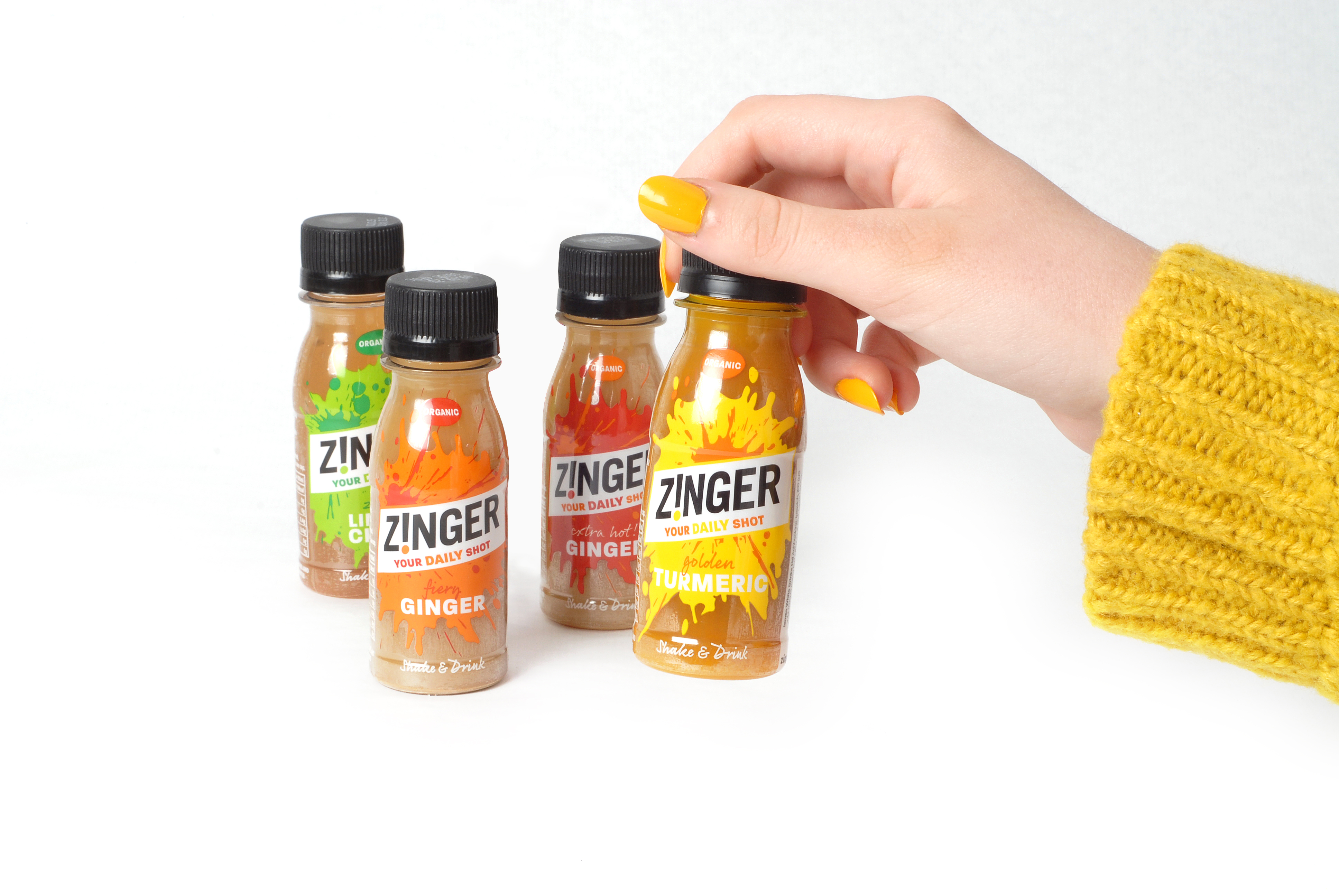
For over three decades James White has been crafting delicious organic drinks on its site in Suffolk, and while its range is both innovative and convenient, its team is cutting no corners when it comes to quality.
Its Zingers are right on the trend pulse – a premium pick-me-up a step above the other options available on the convenience market, the four-strong range has been a strong seller since launching in 2015. “As well as our popular Ginger Zinger and Turmeric Zinger we make an extra-hot ginger with double the amount of ginger and a hit of chilli, as well as a Lime & Chilli Zinger with a little more sweetness,” says Zoe Lamb, NPD and marketing manager.
“Our most popular product is Beet It, an organic beetroot juice, and Big Tom, a spiced tomato juice, but we also produce a range of apple and vegetable juices.” As many of the ingredients as possible are sourced locally before being bottled on-site. “For example,” says Zoe, “we source a lot of beetroots from farms nearby in Suffolk and Cambridgeshire.”
These suppliers are carefully chosen, with organic credentials playing a large role in James White’s sourcing decisions. “We use organic products because we understand the importance of looking after the environment and the world we are in,” explains Zoe. “We want to ensure that our products aren’t harming that, and that they are the best-tasting that they can be – we have found that organic ingredients simply taste the best.”
Pressed, mixed and bottled on-site, James White’s flavour-packed range doesn’t only offer a solution for shoppers looking for a hit of goodness but also for retailers keen to make convenient savings. “The fact our juices are ambient means that retailers don’t need to worry about using valuable refrigerator space, or about shelf life as a lot of our products have a 12-18 month shelf life.”
Organic, convenient and bang on trend, James White’s range is a perfect fit for discerning independents.
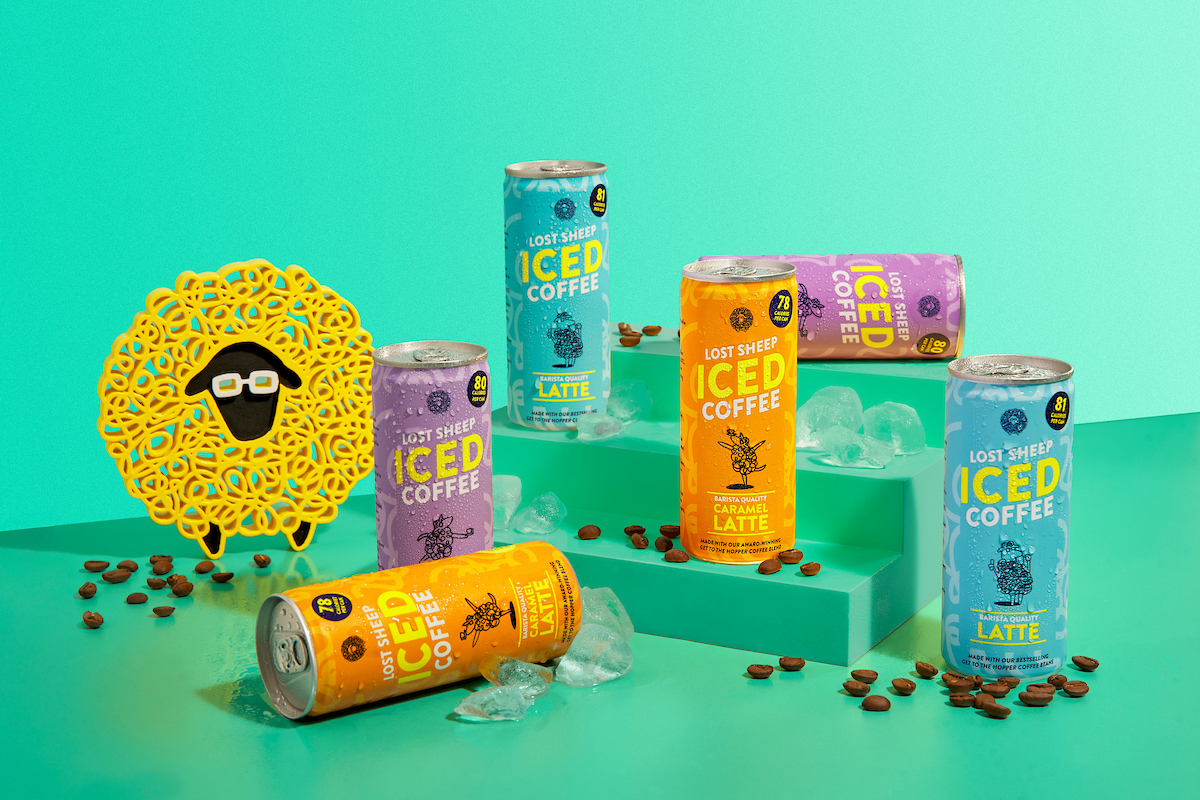
“We’ve made millions of cups, so we know what it takes to make a really great speciality coffee,” says Lost Sheep Coffee founder Stuart Wilson.
Inspired by the ‘relaxed but geeky’ craft coffee scene in Melbourne, discovered during his travels nearly 15 years ago, Stuart’s creative and passionate approach to the industry has made Lost Sheep Coffee a leader in the speciality field, operating numerous coffee shops, as well as a successful wholesale operation.
When it launched in 2012, Lost Sheep Coffee injected new energy into the scene - an energy that was supercharged last year, when the brand introduced a duo of super premium RTD iced coffees in cans – Latte and Mocha - which quickly picked up industry accolades, including gold (Mocha) and bronze (Latte) at the coveted Great British Food Awards.
Most recently a third SKU, Caramel Latte, has joined the family. Each of the cans contains less than 85 calories, half the sugar of leading competitors, is fully ambient and VAT-free (a huge bonus for retailers), and taps into the growing consumer desire for ‘clean energy’ and functional drinks, being a delicious, natural source of caffeine.
“When we look at the market,” Stuart says,” the main consumers of canned coffee are Gen Z and Millennials. And data for Gen Z, for example, shows they drink more cold coffee than hot, but are just as discerning about flavour and what they choose as everyone else. What was lacking in the marketplace was a high-end, premium offering.”
And that’s where Lost Sheep Coffee comes in. “The whole point of Lost Sheep Coffee is to make speciality coffee accessible and totally unpretentious. RTD’s are a great way to do that,” Stuart continues.
The uniqueness of Lost Sheep Iced Coffee begins with the brand’s fully traceable Get To The Hopper blend – a duo of Grade One Brazilian and Colombian beans, renowned as being in the top five in the world for quality.
“It’s our take on the classic Melbourne-style coffee we drank in 2011,” Stuart explains. “And it’s our most popular blend by an absolute country mile. It’s a medium roast, with notes of chocolate and caramel.
“It’s so important to us to use our own blend. Every single bean used in each can has gone through our roastery, and we can trace them back to the family farms that grow for us.”
Unlike other brands, Lost Sheep Coffee freshly grinds, brews and flash chills its coffee for use in their RTD Coffee products. “Most of the drinks on the chiller shelf are made with instant coffee, even the brands you would not expect” Stuart says. “We do not, and will not ever, use instant coffee. There’s a massive taste difference, and for us, it means the drink cans have zero bitterness. It’s all smooth.
“Customers can just chill, shake and enjoy. They’re essentially getting a full barista experience, just like they would in a coffee shop. All with the shake of a can!”
Lost Sheep Iced Coffee is available now from Cotswold Fayre.
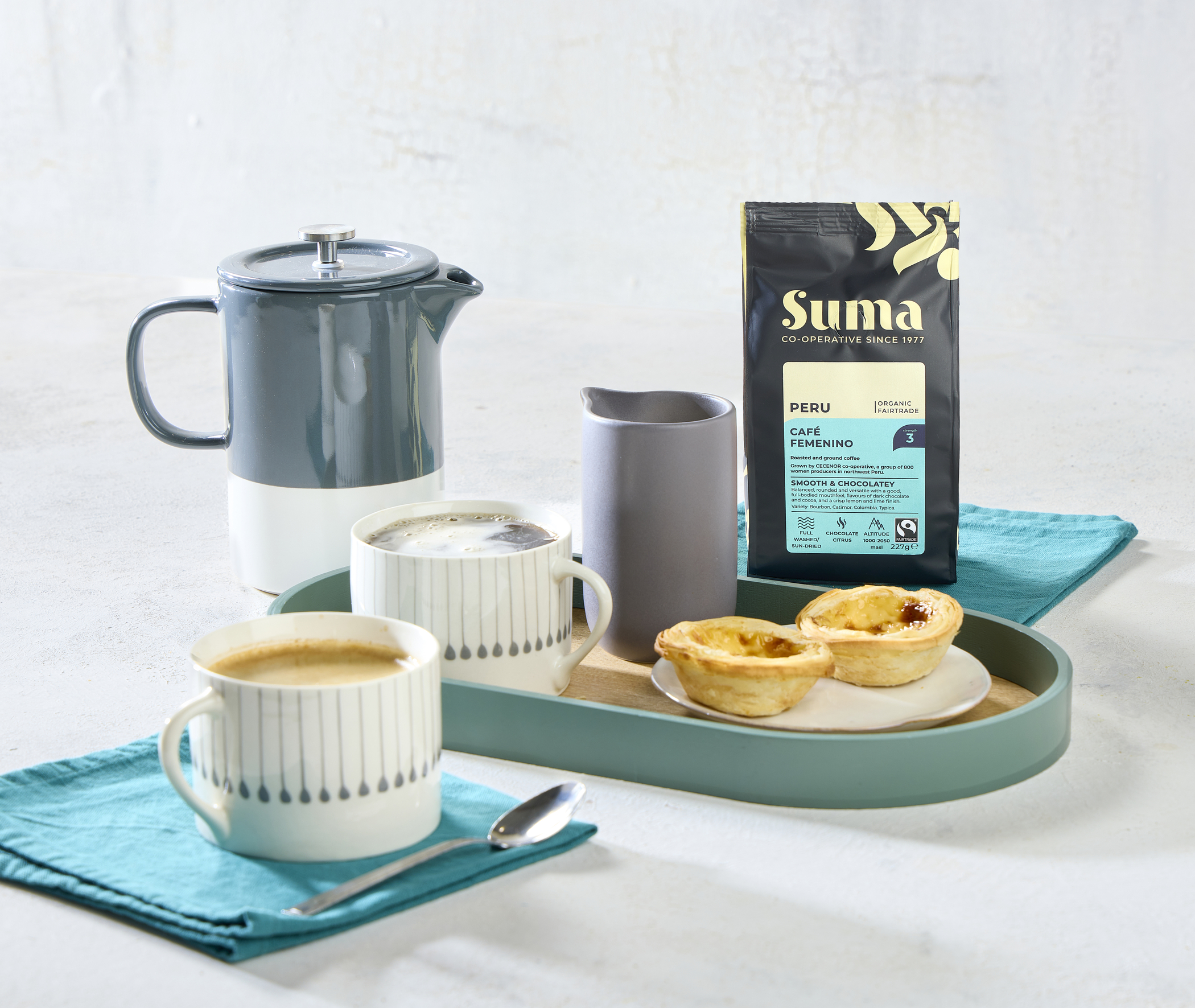
Suma Wholefoods has long been a champion of ethical trade, and its newly rebranded organic Fairtrade coffee range reflects its commitment to fairness and sustainability. More than just a fresh new look, the range represents real investment in farming communities and better livelihoods for growers.
Suma’s coffee is sourced from smallholder co-operatives across Latin America, Africa and Southeast Asia, where farmers receive a guaranteed minimum price under Fairtrade certification. This ensures they are not at the mercy of volatile global markets. The additional Fairtrade premium funds essential community projects, such as education and female empowerment in Peru, sustainable agriculture training in Sumatra, and social justice initiatives in Ethiopia.
As a worker-owned co-operative, Suma is dedicated to fair business practices and supporting other co-operatives. Its coffee is grown organically, without synthetic pesticides or fertilisers, protecting both farmers and their land.
The rebrand gives the range a fresh, modern identity while keeping its core values at the forefront. The bold new packaging highlights the coffee’s origins and the real impact behind each purchase.
With a choice of blends, from dark, intense espresso to smooth, easy-drinking roasts, Suma’s organic Fairtrade coffee delivers on taste while supporting co-operatives that prioritise fair pay and long-term resilience.
By choosing Suma’s coffee, consumers are directly supporting farmers and their communities - ensuring a fairer deal for those who grow it.
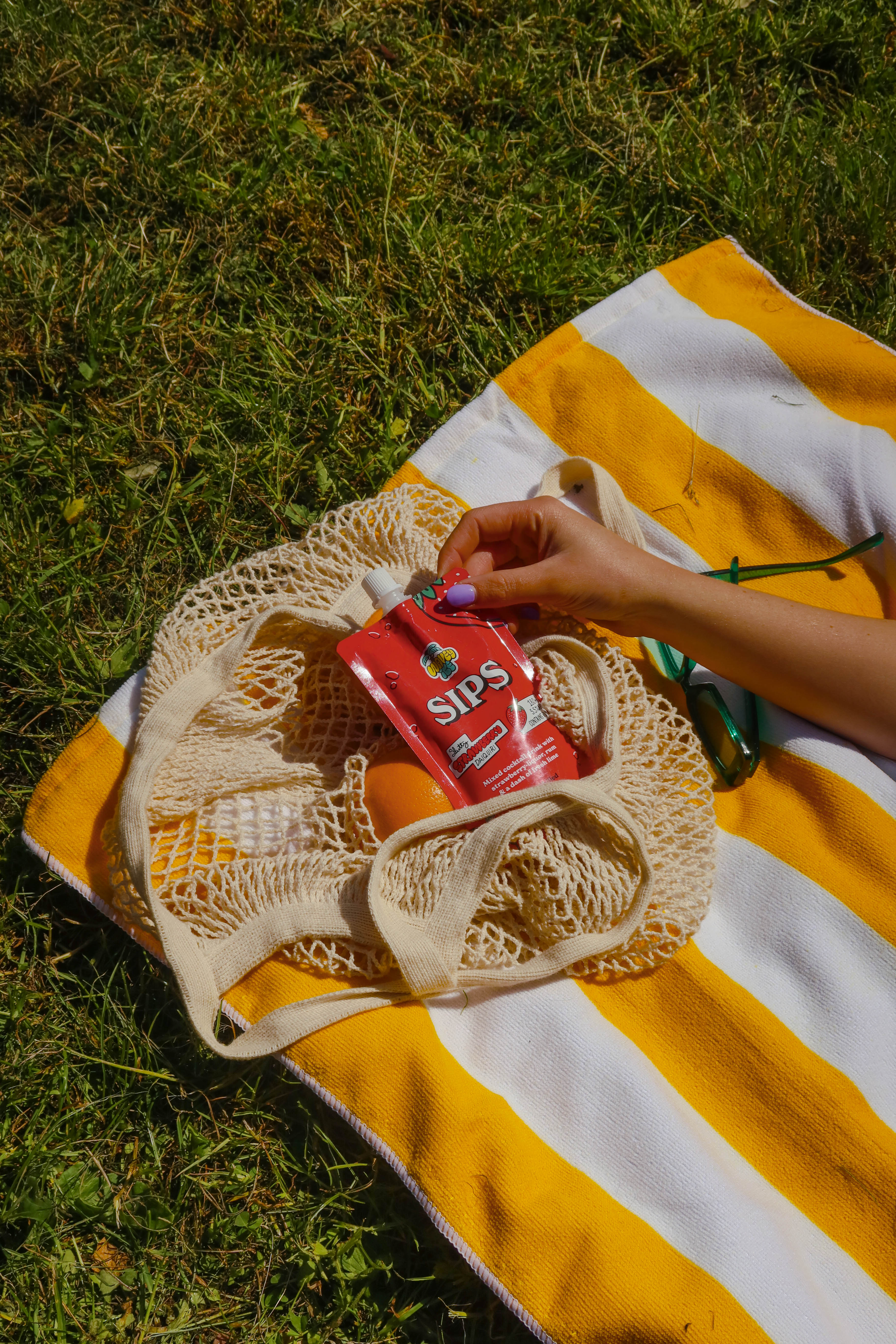
Picnics, parties, festivals… All serve up moments to cherish, but finding a drinks format that is not only convenient but also satisfying for a range of palates used to be a challenge until Wavey Ice’s pouches of ready-made cocktails hit the scene.
Launched in September 2022 as a follow-up to the brand’s alcoholic ice pops, the four-strong Sips line was instantly a hit with Wavey Ice’s community of loyal followers – who have, since the brand’s inception, played a vital role in the growth and shaping of the business including ideas for new products.
“We keep an ear to the ground when it comes to trends, but we’re most inspired by our community who share ideas on social media and email,” says Laura Davis, managing director.
The range now consists of seven year-round products – Strawberry Daiquiri, Espresso Martini, Orange & Vodka, Tropical Rum Punch and Pornstar Martini, plus two non-alcoholic options: award-winning Mango & Pineapple Mojito and Sex On The Beach – as well as some seasonal specials.
The Northern Ireland-based business sources ingredients locally wherever possible, including NI-made spirits and coffee for its Espresso Martini from a local nitro cold brew coffee company, catering to the growing demand for provenance from its community present and future.
This community is wider-ranging than you might think, according to the brand’s extensive data gathered over three years of e-commerce. “People presume that we have the standard RTD customer base of 25-34 year olds, but actually we’re very popular with older age groups as well.”
Laura, who co-runs Wavey Ice with her sister, takes the brand’s role in society seriously. “In terms of sustainability, we are working towards making all of our range 100% recyclable, and we also do what we can to keep our customers safe – our pouches are not only more convenient than cans, because you can carry more at any given time and they are ready-to-drink and no-spill, but they are anti-spiking so people can feel safe when they’re out and about drinking Wavey Ice.
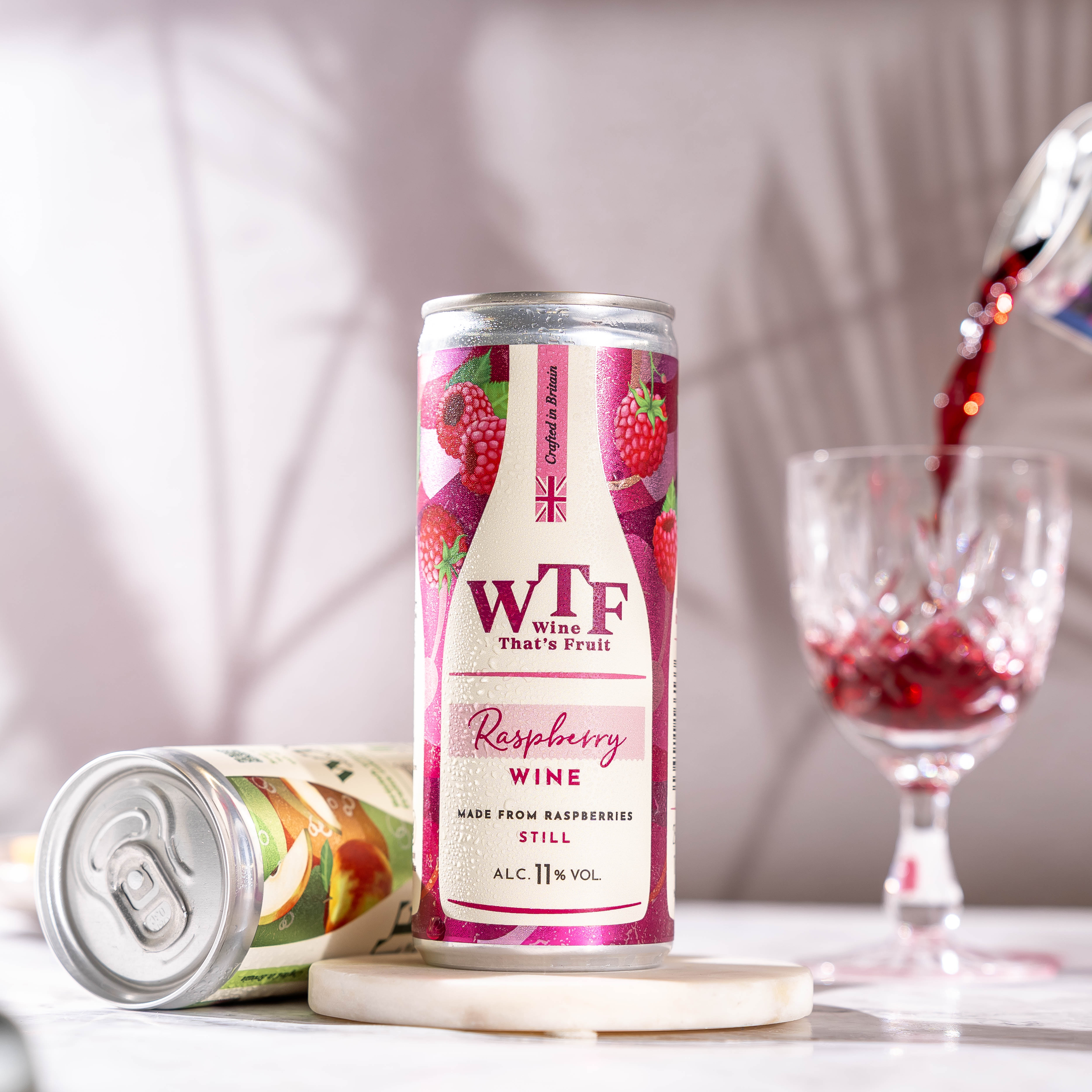
The British wine market is enjoying a whole new audience. As the shelf appeal of RTD cocktails increases, so too does the appetite for canned wines – especially amongst the Millennial audience.
Canned wine is innovative, approachable and unstuffy. It allows consumers to moderate intake and switch varieties without waste. It has unmistakeable sustainability credentials, being lighter to ship and transport than glass, being endlessly recyclable, whilst also creating the ideal environment to keep the wine fresh – no more corked wine! Best of all, it’s incredibly portable, supporting our active lifestyles. Taking a few cans to enjoy at the races, a gig or the beach on a picnic, has become really rather fashionable.
For Peter Allen, founder of Herefordshire-based Wine That’s Fruit, starting an RTD wine business two years ago was a no-brainer. He was inspired by the fruit-based drinks he conjured up for his granny and her friends in his youth, and brought this to life through Wine That’s Fruit.
“With traditional wine sales flatlining and the RTD market growing rapidly, I knew we needed to innovate with both the product and the packaging. It needed to move forward like other drinks have. That’s why RTD products have caught people’s imagination,” he says.
Wine That’s Fruit is fruit wine for the next generation. A more sophisticated serve – wine made from fruits other than grapes. It’s made simply by squeezing all the goodness out of locally grown orchard fruits and berries and using time-honoured natural fermentation techniques (just like traditional wine), allowing the beautiful essence of each fruit to shine through, in every sip.
There are four flavours in the range, all being 11% ABV. They avoid using any ‘nasties’ when making their fruit wine, following a motto of ‘less is more’ – so the wines are each uniquely sulphite-free, vegan friendly and naturally gluten-free.
A treat that’s accessible to all!
Wine That’s Fruit’s lightly sparkling Apple Wine has a delicate mouthfeel and true appley flavour that works beautifully alongside a cheeseboard or even Sunday’s roast pork.
The sparkling Strawberry Wine is loved by customers for its sunshiny, summery flavour – a perfect aperitif with a few sprigs of mint and slivers of cucumber.
Wine lovers appreciate the rich, rose-like colour and tart, bright flavour of the brand’s still Raspberry Wine (ideal with charcuterie). While the still Blackcurrant Wine boasts versatility as a chilled drop alongside roast lamb or beef, or served warm in the winter months with a twist of orange peel, spices and maybe a splash of brandy.
Wine That’s Fruit products are available direct from the business. “The appeal for the trade,” says Peter, “is that we’ve got something here that’s quite different. Something you can’t find anywhere else with unique properties that resonate with the core RTD audience.
“And WTF, with a cheeky name to boot!”